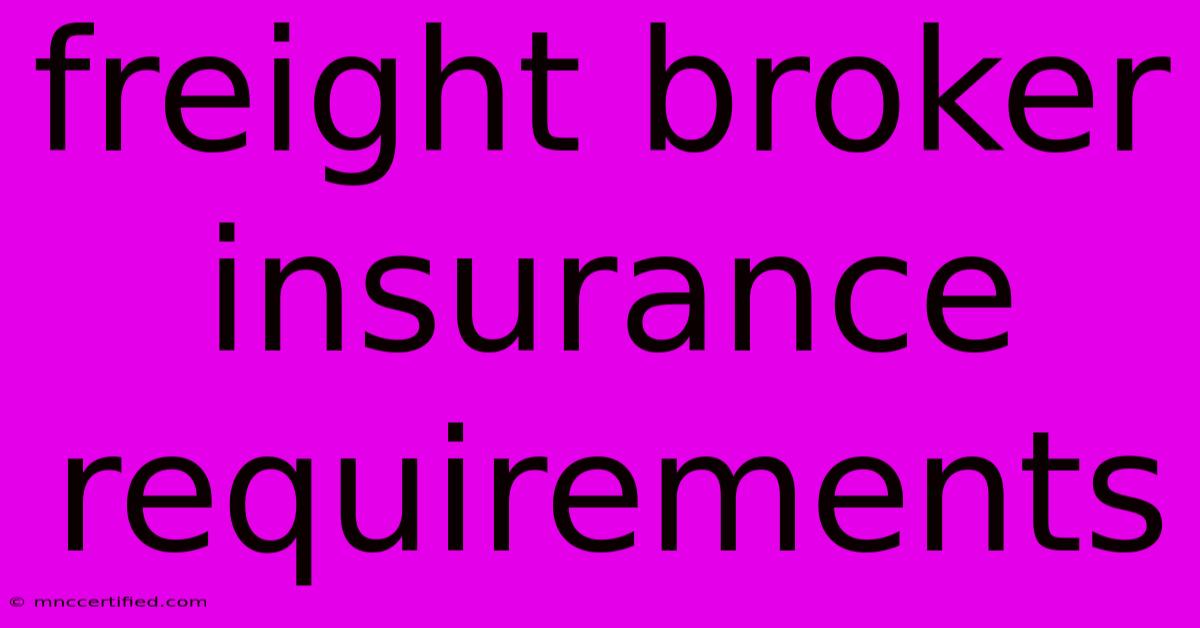Freight Broker Insurance Requirements

Table of Contents
Navigating the World of Freight Broker Insurance: A Comprehensive Guide
Becoming a freight broker is an exciting step in the transportation industry, but it comes with responsibilities. One of the most crucial aspects is understanding and securing the right insurance coverage. This guide will provide a detailed breakdown of the essential insurance requirements for freight brokers, helping you operate safely and confidently.
Why Do Freight Brokers Need Insurance?
Freight brokers act as intermediaries, connecting shippers with carriers. This role brings inherent risks, including:
- Financial Liability: If a carrier fails to deliver cargo or damages goods, the shipper may hold the broker responsible.
- Legal Disputes: Disputes can arise over contracts, payment terms, or cargo handling, leading to potential lawsuits.
- Worker's Compensation: While brokers often work independently, they might employ staff, necessitating coverage for employee injuries.
Essential Insurance Coverage for Freight Brokers:
1. Freight Broker Bond:
This is mandatory in most states and is not technically insurance. It functions as a financial guarantee, protecting shippers from financial losses if a broker fails to fulfill its obligations.
- Amount: Bond amounts vary by state, typically ranging from $10,000 to $75,000.
- Purpose: Shippers can file claims against the bond to recover losses related to cargo damage, non-delivery, or other breaches of contract.
2. Cargo Liability Insurance:
This insurance protects the broker against claims arising from damage or loss of cargo while in transit.
- Coverage: It covers the value of the goods being transported, including potential damage, theft, or accidents.
- Importance: This insurance is crucial for mitigating financial risks associated with cargo-related incidents.
3. General Liability Insurance:
Provides coverage for claims arising from bodily injury or property damage caused by the broker's operations.
- Examples: This could include accidents on broker premises, injuries caused by employees, or damage to third-party property.
- Protection: General liability insurance protects the broker from lawsuits and financial losses resulting from such incidents.
4. Errors and Omissions (E&O) Insurance:
This type of insurance protects brokers from claims related to professional negligence or errors in their services.
- Common Claims: These include failing to secure proper transportation, providing incorrect information, or neglecting to comply with regulatory requirements.
- Value: E&O insurance is vital for mitigating the financial impact of errors that could lead to costly lawsuits.
5. Worker's Compensation Insurance (If Applicable):
This coverage is necessary if the broker employs staff, as it protects employees in case of work-related injuries or illnesses.
- State Requirements: Workers' compensation insurance is mandated by most states for employers.
- Benefits: It covers medical expenses, lost wages, and other benefits for injured employees.
6. Additional Coverage:
- Cyber Liability Insurance: Protects against data breaches, cyberattacks, and other digital security threats.
- Environmental Liability Insurance: Covers pollution or environmental damage caused by the broker's activities.
- Professional Liability Insurance: Provides broader coverage for professional negligence, including errors and omissions, legal defense costs, and settlements.
7. Insurance Considerations:
- State Requirements: Insurance requirements vary by state. Consult your state's transportation authority for specific regulations.
- FMCSA (Federal Motor Carrier Safety Administration): While the FMCSA doesn't mandate specific insurance for brokers, they have strong guidelines that you should follow.
- Carrier Coverage: Inquire about the carrier's insurance coverage before dispatching a load.
- Policy Limits: Ensure that your insurance policy limits are adequate to cover potential risks and potential claims.
8. Obtaining Insurance:
- Insurance Brokers: Specialized insurance brokers can help you obtain the appropriate coverage.
- Comparison Shopping: Compare quotes from multiple insurers to find the best rates and coverage options.
- Review Policies Carefully: Understand the terms and conditions of your policy before signing any agreement.
Conclusion:
Obtaining the right insurance is essential for protecting your business and mitigating financial risks. By understanding the key requirements, comparing options, and reviewing policies carefully, you can build a solid foundation for success in the freight brokerage industry. Remember, proper insurance is not just a legal requirement but a crucial investment in your long-term stability and peace of mind.

Thank you for visiting our website wich cover about Freight Broker Insurance Requirements. We hope the information provided has been useful to you. Feel free to contact us if you have any questions or need further assistance. See you next time and dont miss to bookmark.
Featured Posts
-
Upsc Current Affairs Quiz November 3 9 2024
Nov 10, 2024
-
Prospect Park Wildfire Forest Area Scorched
Nov 10, 2024
-
Insurance Brokers In Sutton Coldfield
Nov 10, 2024
-
How Much Are Retainers With Insurance
Nov 10, 2024
-
Prithvi Shaw A Hundred On Debut
Nov 10, 2024